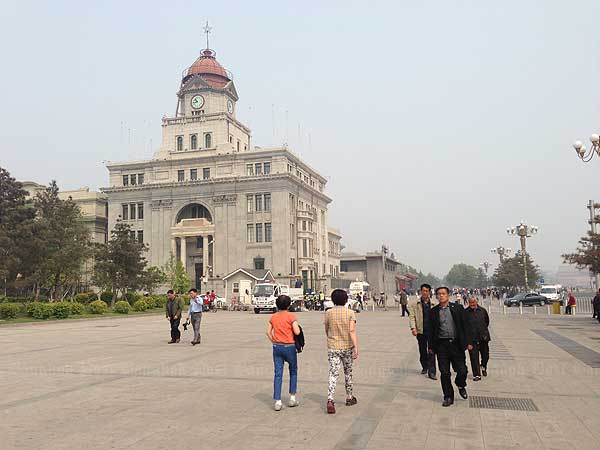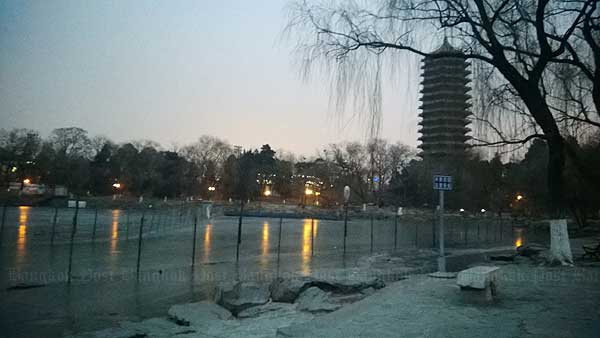
Thai students experience festivals in China
By Suwitcha Chaiyong
Photos courtesy of Pitchanart Khamyuang,
Bhubest Jieansinghakul and Chisanupong Singkanokrath
Did you know
The Qixi Festival, or Chinese Valentine’s Day, has been celebrated since the Han Dynasty
With both Chinese New Year and Valentine’s Day happening this week, Student Weekly chatted with three students who have studied in China and Taiwan about how Chinese people celebrate and how young people date in Beijing and Taipei.
While 21-year-old sophomore student Pitchanart Khamyuang (Mild) earned a scholarship from Office of the Civil Service Commission and is studying law at Peking University, 19-year-old Bhubest Jieansinghakul (Best) studied Mandarin at Beijing 39 School in 2014, and 19-year-old Chisanupong Singkanokrath (New) studied Mandarin at National Taiwan University during his school breaks in 2013 and 2014.
Student Weekly: Why were you interested in studying in China?
Mild: I became interested in China when I saw the impressive opening ceremony of the Beijing Olympic Games in 2008 on TV. I’ve been studying in China for four years so far. I studied language the first year and was at prep school during the second year, before entering law school at Peking University.
New: I enjoyed learning Mandarin and wanted to study where it’s the official language. I have friends who are Taiwanese-Thai and they suggested that I study in Taipei. I was there for two months in 2013 and a year later for another three months. I also went back to celebrate Chinese New Year.
Best: I studied Mandarin in Thailand and wanted to try something new. I studied in Beijing for around four months.

Student Weekly: How is the atmosphere in the classroom?
Mild: The competition between students is high. Everybody works hard and is enthusiastic about attending lectures and asking questions after class. Chinese students finish their meals very quickly so they can read their books. Instructors are open minded and aren’t strict about rules.
Best: Instructors focus on speaking and listening skills and repeat phrases until students understand. I could speak Mandarin after a few months. I had a Thai roommate but spoke Mandarin with him.
New: In Taipei, lessons are practical. I learned conversations that I could use in real life. I also liked to speak with Chinese people, though I wasn’t good at the language. After the first session, I could communicate basic ideas.
Student Weekly: How did you celebrate Chinese New Year?
Mild: They have big celebrations, similar to Thailand, with fireworks and parties. Most people have a meal with their family. All stores are closed during the two-week holiday, so people have to store their food.
New: I went to the Taipei 101 skyscraper which is a popular spot for the New Year countdown. I was impressed by the huge fireworks they had.
Student Weekly: Do Chinese people celebrate Valentine’s Day?
Mild: Young people celebrate both Valentine’s Day and the Qixi Festival which is Chinese Valentine’s Day. Couples buy flowers and presents for each other. At Peking University, students can send love letters to their crushes or lovers through the Student Club, but I never did.
New: People in Taipei don’t pay much attention to Valentine’s Day, like Bangkokians. I saw some roses, but not many.

Student Weekly: How do young people like to date?
New: Couples in Taipei like to walk in markets, ride bicycles and trek to Elephant Mountain.
Mild: In Beijing, couples dine out and see movies like Thais. They also like to have picnics in parks during autumn to see the leaves changing colours.
Best: Couples hang out at malls and parks, but in school there’s a rule that students aren’t to walk side by side with the opposite gender. If anybody breaks the rule, their parents will be called in to meet the teachers.

Student Weekly: What was the best thing you learned from living in China?
New: I got better language skills. I like the quality of people in Taiwan. They’re always punctual and work very hard. I’ve never seen beggars there. They have street performers, but nobody begs for money.
Best: My Mandarin improved rapidly. They have great methods to teach foreigners.
Mild: I learned to be responsible because there’s a lot of freedom. Peking University allows students to choose any elective classes even if the subject doesn’t relate to our major. There’s no uniform and it’s the student’s choice to attend a class or not. You have to consider the consequences of any decisions you make.

Vocabulary
- prep school (n): in the UK, a private school paid for by parents not the government, for children between the ages of seven and 13
practical (adj): relating to experience, real situations or actions rather than ideas or imagination
store (v): to put or keep things in a special place for use in the future
skyscraper (n): a very tall modern building, usually in a city
crush (n): a strong feeling of love, that usually does not last very long
trek (v): to walk a long distance, usually over land such as hills, mountains or forests
beggar (n): a poor person who lives by asking others for money or food
consequence (n): a result of something that has happened
comments powered by Disqus


